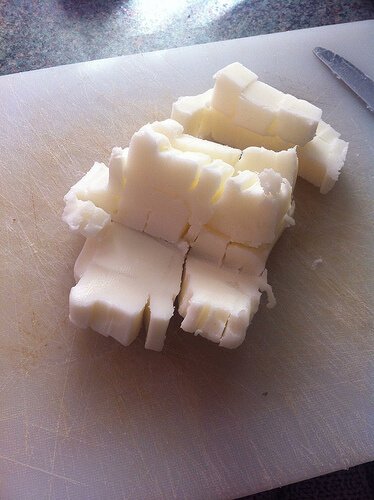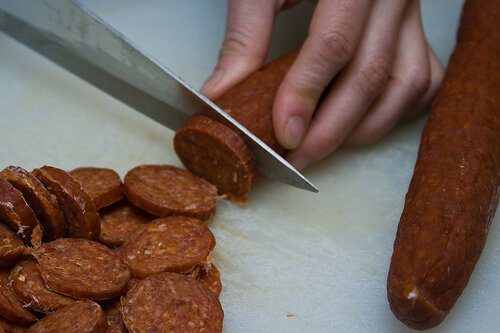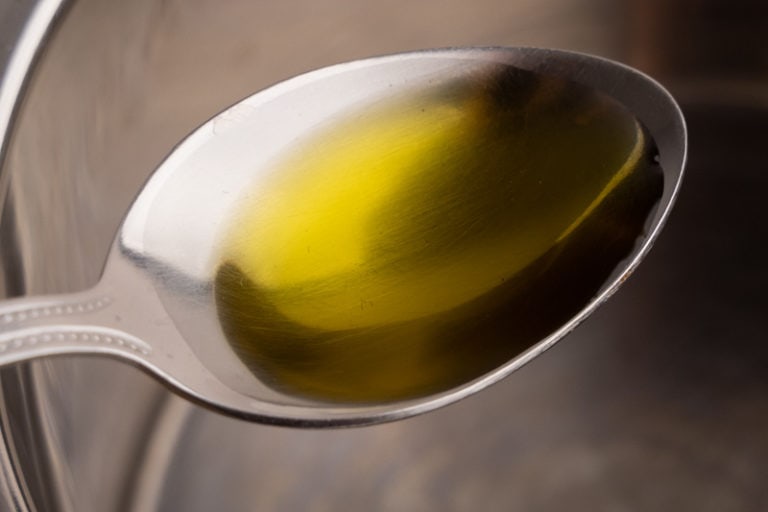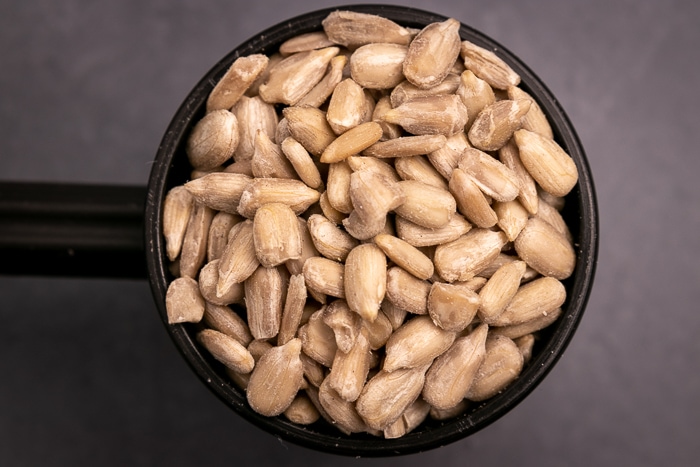How Long Do Chia Seeds Last and When to Toss Them?
Found a bag of expired chia seeds and not sure if you can still use them? How long do chia seeds really last?
The good news is that your out-of-date chia seeds are likely fine. Even if they’ve expired a few months ago.
Let’s talk about the shelf life and going bad of chia seeds, and whether you need to refrigerate them or not.
Do Chia Seeds Go Bad?
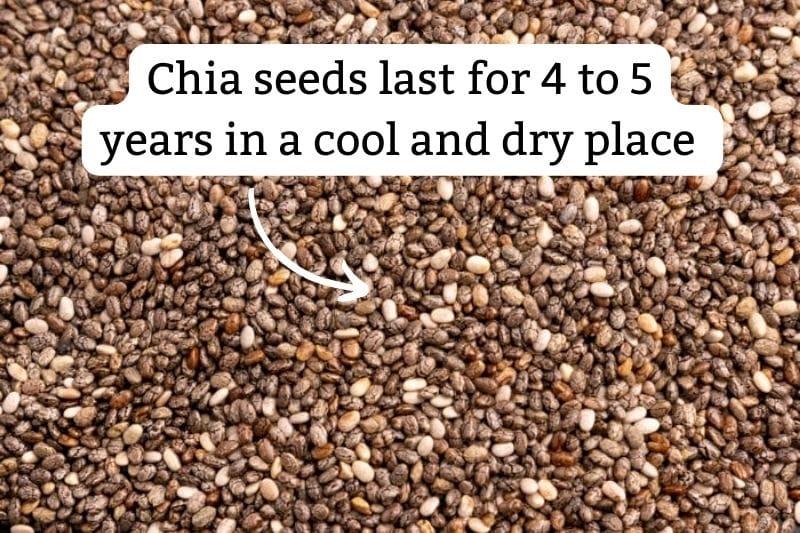
According to the Harvard School of Public Health, chia seeds last 4 to 5 years even if you don’t refrigerate them. All they need is a cool and dry spot and being tightly sealed.
Thanks to a high amount of antioxidants, chia seeds have quite a long storage time, but they don’t last forever. If stored long enough or in poor conditions, chia seeds will eventually go rancid, and that’s when you should toss them.
So, does that mean expired chia seeds are okay to eat? I’m glad you asked.
Expired Chia Seeds
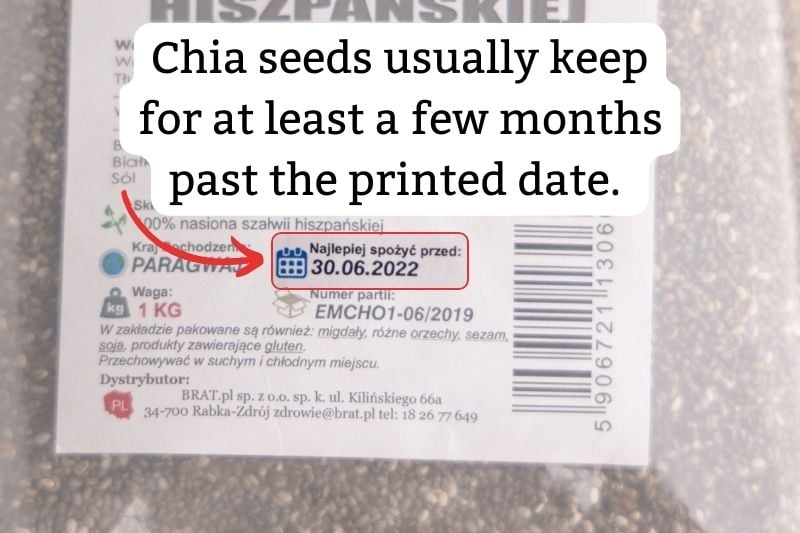
You can eat chia seeds past their printed date if the seeds don’t show any signs of spoilage, such as rancidity, pantry bugs, or mold. But if either of the spoilage signs is present, you should discard them.
That means that being out-of-date isn’t a good enough reason to toss your chias. You should check for actual signs of spoilage, and if there are none, it’s okay to eat the seeds.
The issue here is that many sellers place a best-by date on the label that’s only 12 to 24 months from the time the seeds are packaged. And, knowing that chia seeds last for 4 to 5 years, that means the seeds will often be perfectly fine for months (if not years) beyond the printed date.
Need an easy way to use up chia seeds? Make chia pudding. Chia pudding typically lasts 5 to 7 days, so you can make a large batch and enjoy the dessert throughout the week.
With that in mind, let’s talk about spoilage signs.
How to Tell if Chia Seeds Are Bad?
Toss your chia seeds if the bag has bugs, there are wet clumps, or if the seeds are moldy or rancid. Your chia seeds are rancid if, instead of smelling slightly nutty and having a mild flavor, they smell like nail polish remover or taste bitter.
Here are the spoilage signs in more detail:
- The seeds are rancid. Chia seeds are quite resistant to rancidification thanks to their antioxidants. That said, they can go rancid if stored for too long or exposed for a prolonged period to warm temperatures, lots of fresh air, or direct sunlight.
- The bag is infested. You’re likely storing chia seeds in the pantry, and that’s where pantry bugs like to hang out, too. If you find pests, eggs, or anything of the like in the bag, consider the seeds gone. And go through other foods in the pantry and get rid of those pests altogether.
- You notice mold or wet clumps. Mold can grow in chia seeds if moisture gets inside the bag. And if that happens, the seeds are no longer safe to eat. But if you store your chia seeds properly, the chances of that occurring are almost none.
If you notice anything else about the seeds that bothers you, trust that instinct and toss the seeds.
(In case you’re wondering, the same spoilage signs are typical for other seeds, e.g., sesame seeds.)
What if you realize your chia seeds are rancid only after eating a bunch?
Eating rancid chia seeds, in all probability, won’t make you sick immediately, especially if you eat a small amount. The worst that could happen is some minor digestive discomfort a few hours after eating.
But there’s speculation that consuming rancid fat may have adverse long-term health consequences, so it’s best to throw out rancid chia seeds.
(Rancidity is also the primary way other seeds, such as flaxseed or sunflower seeds, go bad.)
Do Chia Seeds Need to Be Refrigerated?
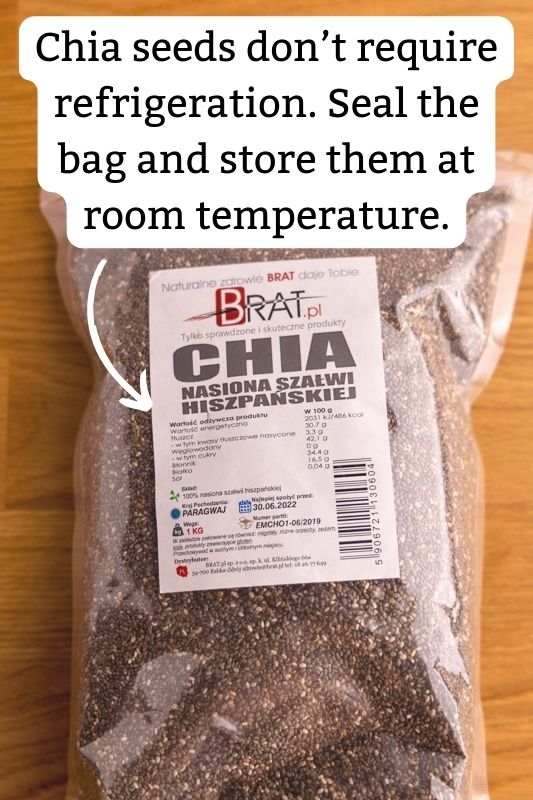
You don’t need to refrigerate chia seeds. You can store them sealed tightly in a cool and dry place, and they’ll last for 4 to 5 years stored this way. If you’d like to extend the storage time and keep them fresh for longer, placing chia seeds in the fridge will help.
Thanks to a high amount of antioxidants, chia seeds last a long time and don’t require refrigeration. That means you can store them in a cupboard in the kitchen or pantry. That’s what I do.
If you decide to place chia seeds in the fridge, ensure they’re well sealed. This way, they don’t pick up any moisture and smell from other foods.
(You definitely don’t want your chias to smell like sausage.)
That tight seal is also useful when storing chia seeds at room temperature because it keeps moisture and pantry bugs at bay. Plus, it limits the seeds’ access to fresh air, slowing down rancidification.
Finally, you can also freeze chia seeds and they freeze well, but due to their long shelf life, storing them at room temperature is usually good enough.
Rotten Records: Share Your Snap!
Caught some food past its prime? Upload your photo to “Rotten Records” and help others spot the signs of spoilage. Every image makes our food community safer and more informed!

![Does Sesame Oil Go Bad? [Shelf Life and Spoilage]](https://www.doesitgobad.com/wp-content/uploads/Sesame-oil-and-other-condiments.jpg)
